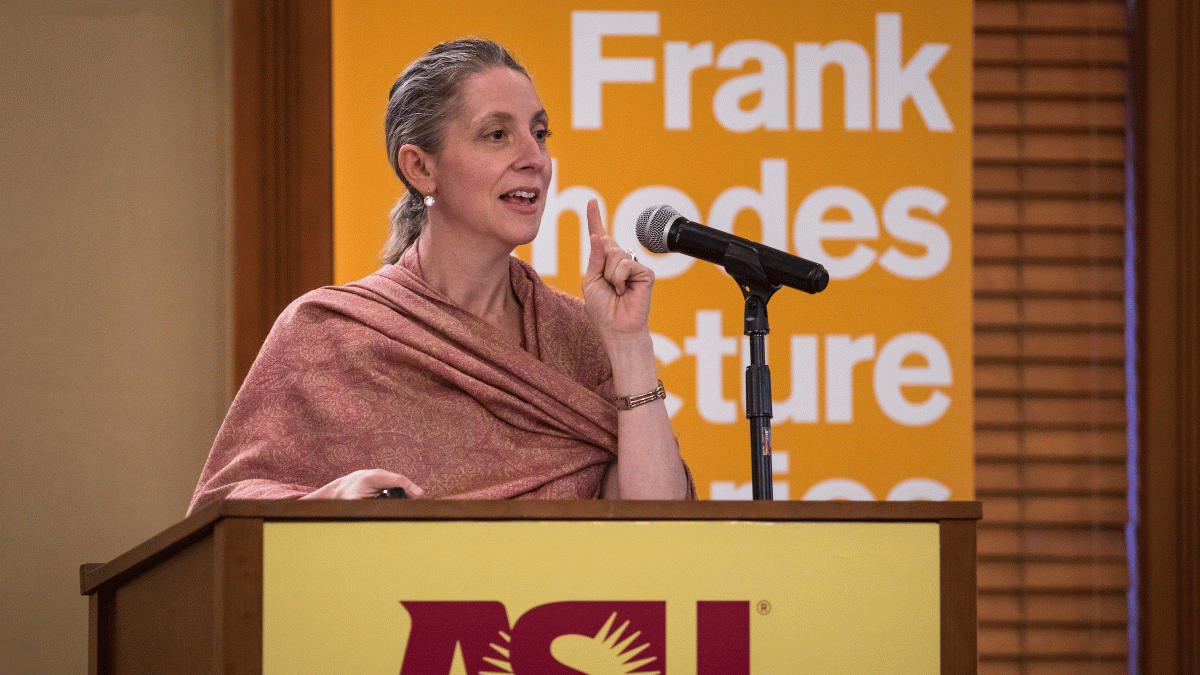There is a perception — shared by education professionals as well as the general public — that education is resistant to change and slow-paced.
Eight hundred million children around the world are not getting an education. How will that change?
By leapfrogging, said Rebecca Winthrop, a senior fellow and director of the Center for Universal Education at the Brookings Institution.
Winthrop spoke at the biannual Frank Rhodes Lecture Series on the Creation of the Future at Arizona State University on Thursday. Each semester an individual with a commitment to institutional innovation visits ASU to deliver a public lecture on the creation of the future as well as meet with members of the university and greater community.
In a new book, “Leapfrogging Inequality,” Winthrop and colleagues at Brookings chart a new path forward in global education by examining the possibility of “leapfrogging” educational development — rapidly accelerating progress to ensure that all young people develop the skills they need to thrive in a fast-changing world.
“The real question is where are we trying to leapfrog to?” Winthrop said. “In education there is a wide range of goals.”
Mass education began in Prussia in the 1700s, when the country was creating a powerful military. There are two problems in global education, Winthrop said.
Skills inequality happens when one group receives a better education than another. How do you get the best of what education has to offer to everybody? In the U.S., wealthy urban children are better-educated than poor rural children.
The other problem is skills uncertainty. In the future, 50 to 70 percent of current worker tasks will be lost to automation.
“Educational systems have to reorient teachers to educate kids for an uncertain future,” Winthrop said. “We have to have young people who are prepared to enter that future.”
Being prepared for that future means having the “competencies and skills to deploy that knowledge in different areas in life,” she said.
That’s achievable by transforming what and how children learn, with access to quality and relevant education.
The core elements of change will be learning and teaching coupled with the recognition that someone else — and not necessarily a school or college — will take over the reins and provide continuing education. She gave employers and nongovernmental organizations as examples.
She cited a successful innovation by a nongovernmental organization in India. The organization went to a number of rural schools. Groups of 10 children were given a tablet loaded with educational material. (Five were to use it in the morning, five in the afternoon. A parent was given the responsibility of charging it.) The tablet was password-protected, so they could only access the educational content.
Most of the kids hacked the portal and began producing videos, seeking out information beyond what they were being taught, and barraging their teachers with unexpected questions.
Six months later, they had a massive increase in literacy skills, and they also became excellent collaborative problem-solvers.
Top photo: Rebecca Winthrop, a senior fellow and director of the Center for Universal Education at the Brookings Institution, delivers the Frank Rhodes Lecture, "Can we Leapfrog?" on Thursday at Old Main on ASU's Tempe campus. Winthrop spoke about "leapfrogging" educational development — rapidly accelerating progress to ensure that all young people develop the skills they need to thrive in a fast-changing world. The "Frank Rhodes Lecture Series on the Creation of the Future: A Lecture Series for a New American University" began in 2011. Photo by Charlie Leight/ASU Now
More Arts, humanities and education

ASU's Neal Lester reflects on life, death of poet Nikki Giovanni
When Neal Lester heard on Monday that poet and activist Nikki Giovanni had died, the news hit hard.Lester, the founding director of Arizona State University’s Project Humanities and a Foundation…

Learning by stepping outside
By Adriana MaestasAmid a world increasingly captivated by all things digital, more than 200 Arizona teachers have crafted immersive educational experiences that nudge students to step away from their…

Behind the curtain: Discovering careers in the arts at ASU Gammage
For a group of students from Sunnyslope High School, Eastmark High School and AZ Teen Homeschool Co-op, a recent December day at ASU Gammage became much more than just a field trip. It became an eye-…
